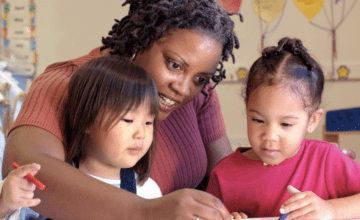Developing self-control begins at birth and continues throughout childhood. Learn what you can do to nurture the development of self-control early.
In order to follow rules and understand limits, children need to develop self-control. Self-control is the ability to cope with strong feelings and stop one’s self from doing something that is not allowed. Developing self-control begins at birth and continues throughout childhood. Young children learn self-control through interactions with peers, parents and other loving adults.
Babies and Self-Control
Babies are not born with self-control. However, they begin developing self-soothing skills—the beginning of self-control—in their first months. For example, many babies learn how to soothe themselves by sucking on a pacifier or finger. This helps them cope with waiting while a loved one gets ready to feed them. Babies are also learning that they can’t always have everything they want:
A 9-month-old grabs the television remote. He is happily pushing buttons when his caregiver gently removes it from his hand and puts it on a bookshelf. She says: “The remote control is not a toy, sweetie. But how about this instead?” She gives him a toy with buttons to push and doors to open.
This baby is learning about self-control because he has to accept a substitute toy—although his caregiver made sure he could still explore with his hands.
What You Can Do to Nurture Early Self-Control:
Help babies learn to soothe themselves. Babies have different ways of calming down. Some need lots of physical contact, such as rocking or hugging, while others like being swaddled or put down for a minute to get a break from interaction. Some babies are soothed by your singing while others need to suck to calm themselves. By trying different things to help babies calm down you help them learn to soothe themselves. You also teach them that they can rely on you, which makes them feel safe and secure.
Find ways to keep yourself calm. Hearing babies cry can be very stressful and frustrating. It can make you feel worried or even powerless when you want to help a baby feel better but nothing is working. When you feel this way, it’s best to put the baby down somewhere safe (like a crib) and take a few moments to calm down. When you are feeling calm, the baby is more likely to feel calm too.
Teach babies what they can do, not just what they can’t. If a 10-month-old is throwing a toy car in the house, gently take it from his hand and give him a soft ball instead and show him a place where he can throw it. Over time, experiences like these help him learn right from wrong. And remember, at 10 months, babies are not able to remember rules so you will probably have to keep doing a lot of distracting and redirecting in the months to come.
Comfort babies. Sometimes caregivers are concerned about spoiling a baby—doing more for her than she needs. If a baby is crying, it is often because she needs you to help her calm down because she is having a hard time coping. Babies need your love and comfort. This helps them grow up to be secure and confident children.



